Between June 10th and June 13th, 2025, the Manhattan Institute conducted a survey of 2,000 registered voters nationwide. The sample was collected online and weighted to reflect registered voters on age, gender, race, region, education, party registration, and 2024 presidential vote. The margin of error is ±2.2%.
Americans of all ages, party affiliations, and racial backgrounds are sounding the alarm: trust in higher education is crumbling, and the system is in need of sweeping reform. Just 15% of voters say they have a great deal of trust in Ivy League colleges—less than almost every other major public institution, including the media. By a double-digit margin, and across a range of demographics, Americans believe that universities are on the wrong track, with overwhelming bipartisan and multiracial support for bold changes: banning disruptive protests, abolishing race-based admissions, reining in DEI, and restoring free speech and academic rigor. Despite deep political division, Americans agree that higher education has lost its way and that it is time to restore excellence.
Full Results Available: Toplines, Crosstabs
Trust Levels
Colleges and universities face a crisis of trust. Only one in five (20%) registered voters say they have a “great deal” of trust in America’s public colleges and universities to act in the best interests of the public. Almost four in ten say they have “not much” trust (23%) or no trust at all (14%) in public colleges and universities, while 58% say they have a great deal (20%) or some trust (38%).
Private Ivy League colleges and universities inspire even less confidence. Only 15% of registered voters say they have a great deal of trust in these institutions, while three in ten (31%) have some trust. 46% overall say they have not much (25%) or no trust at all (21%).
Figure 1: Trust levels in institutions among registered voters
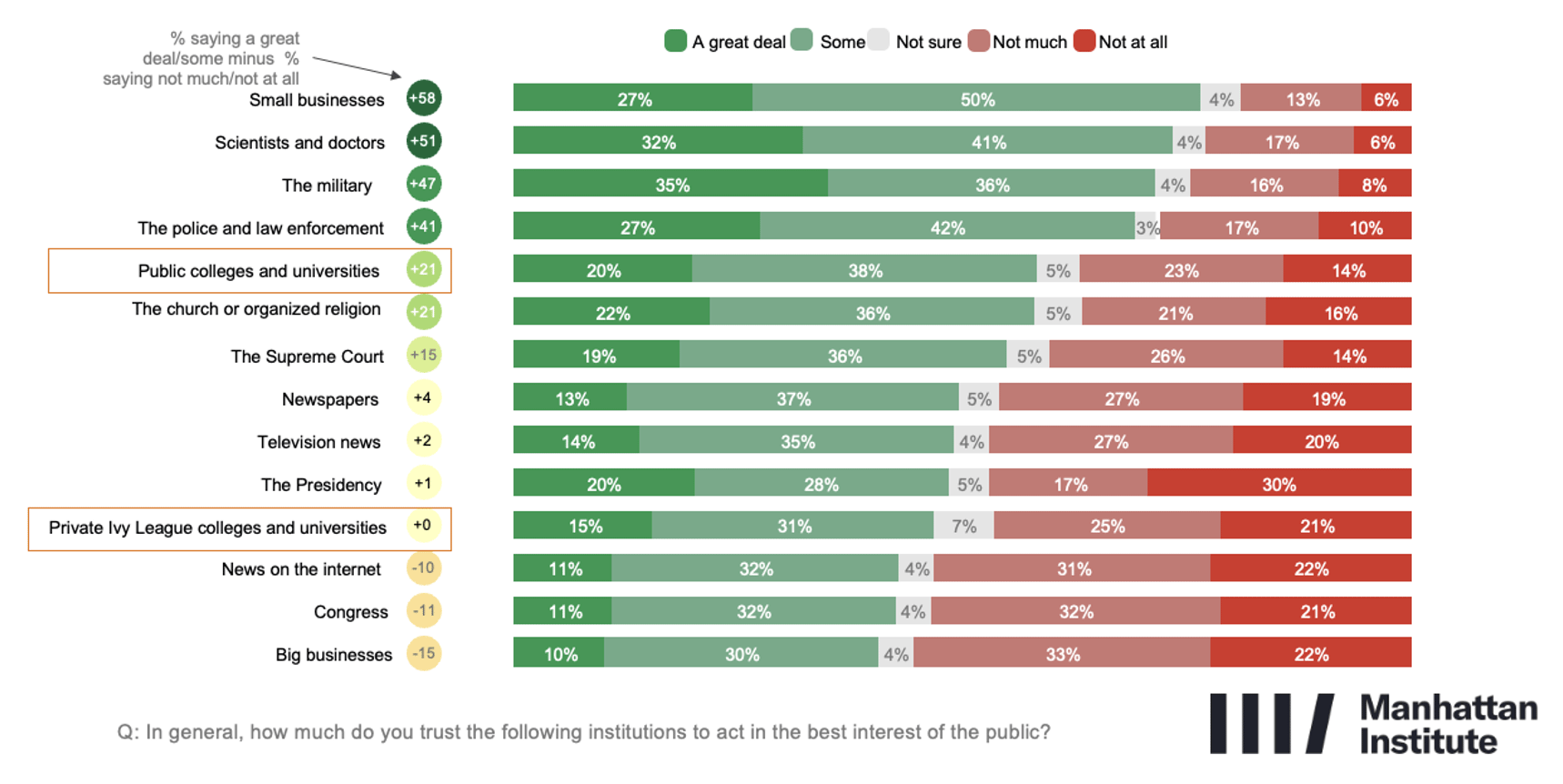
These results place Ivy League colleges among the nation’s least trusted institutions. They draw similar levels of distrust as the media—including newspapers (46% distrust) and TV news (47%)—the Supreme Court (40% distrust), and the Presidency (47%). Public and Ivy League colleges fall well below mainstay institutions like police, military, scientists, and small business. Only big business, Congress, and internet news are significantly less trusted.
Distrust falls along a strong partisan gradient, the result of colleges and administrations wading into national politics at the expense of their missions. For example, while 75% of Democrats have some or a great deal of trust in public universities, only 49% of Republicans feel the same way. And for Ivy League colleges, while 65% of Democrats say they have some or a great deal of trust, only about half as many—34%—of Republicans say the same.
Direction of Higher Education
Almost half of registered voters (45%) say that higher education in the U.S. is on the wrong track, with only one in three (35%) saying it is headed in the right direction. Elite higher education such as Ivy League schools receive similar reviews (43% wrong track and 34% right direction).
Figure 2: Registered voters believe higher education is on the wrong track
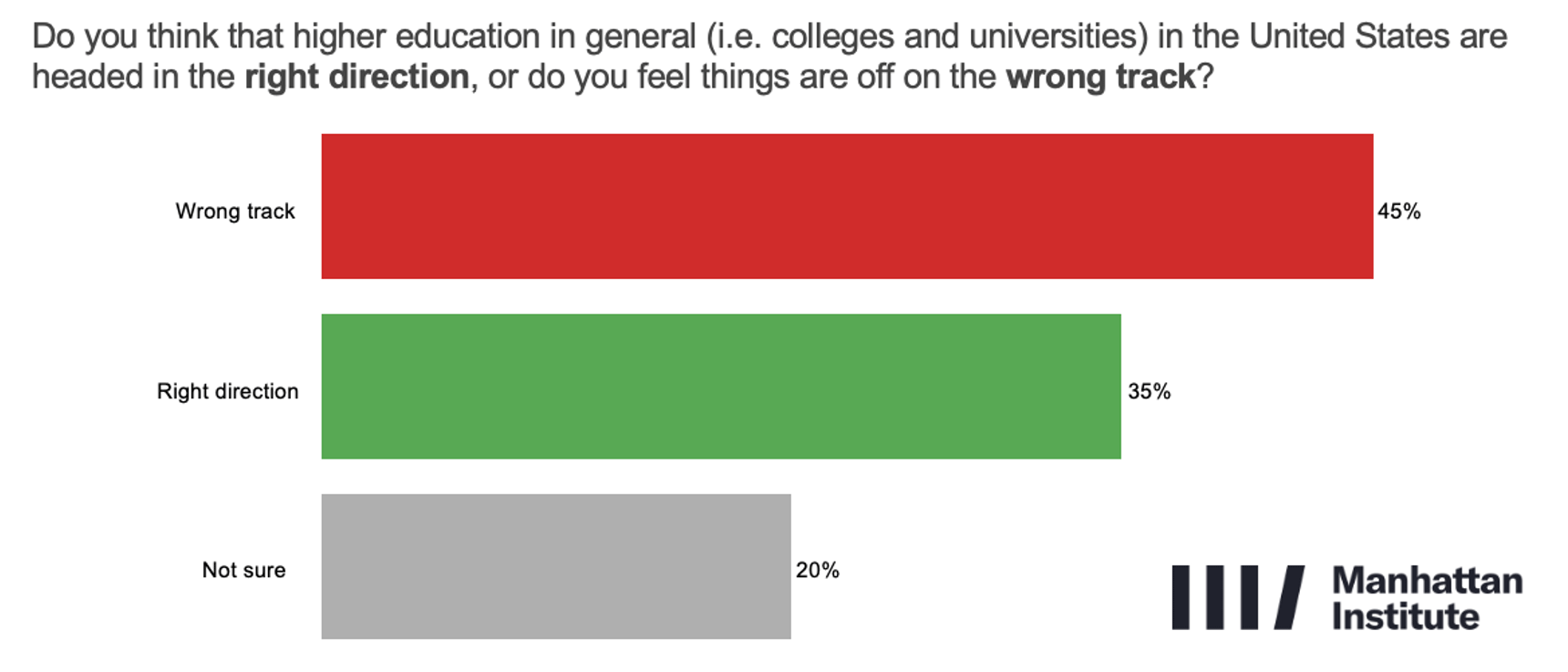
The view that higher education is on the wrong track is held across demographic lines, including 46% of men and 44% of women, 46% of college graduates, and 46% of those without a college degree. There is, however, a sharp age gradient: 18–29-year-olds narrowly believe it is headed in the right direction (44%, vs 42% wrong track), 30–49-year-olds are evenly split (41% to 41%), while 50–64-year-olds and over-65s believe it is on the wrong track, by margins of 46% to 31% and 49% to 28%, respectively.
A slim majority of Democrats agree that higher education is on the wrong track (41%) rather than headed in the right direction (39%), but they are more defensive of elite institutions, which 46% of Democrats believe are on the right track, compared with 34% who say they are headed in the wrong direction.
Free Speech
Americans believe universities should support free speech. More than half (51%) say that universities should protect free speech even if it offends, while only 36% say it is more important for universities to protect students from perceived offensive or harmful speech. An additional 13% are unsure.
Figure 3: A majority say free speech should be the utmost priority
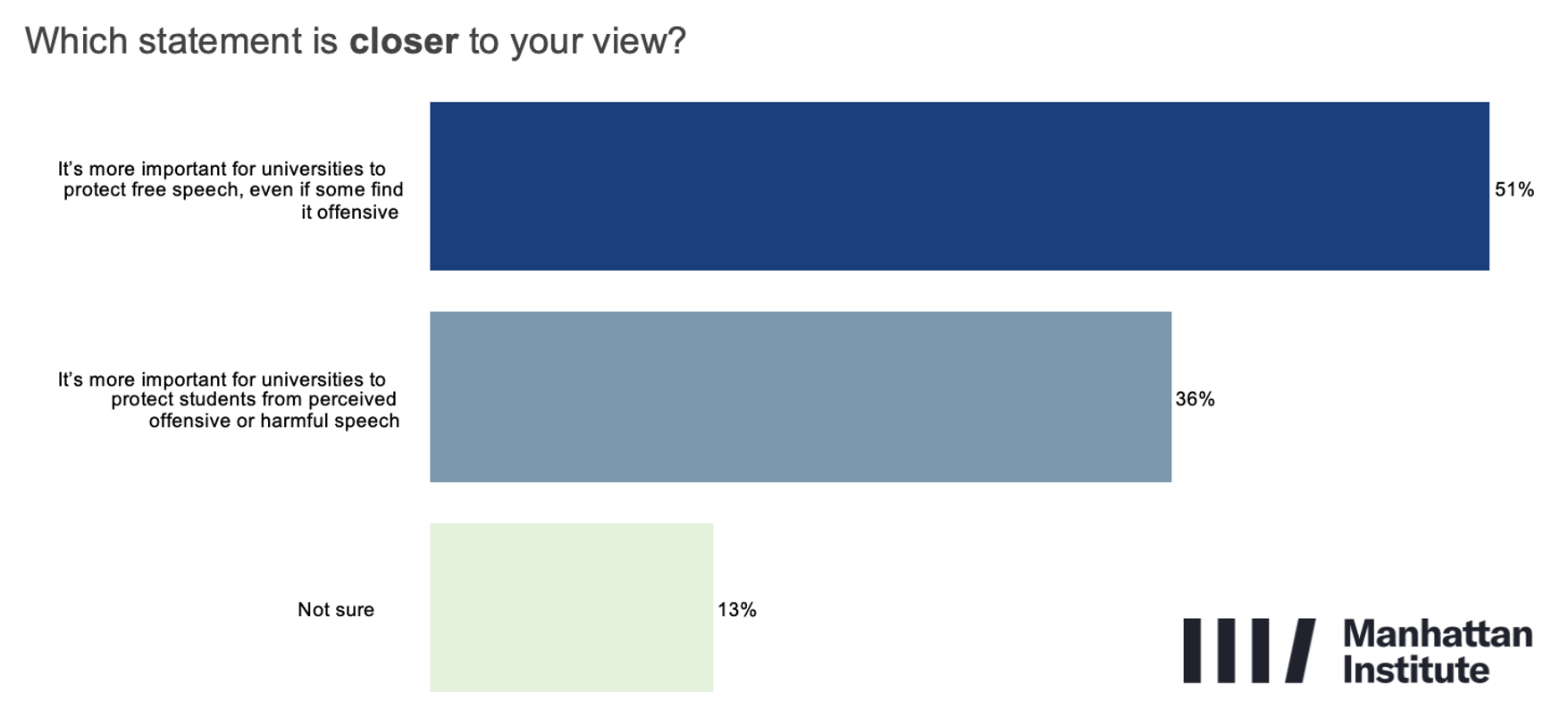
A majority of Democrats agree that universities should protect free speech even if it offends, by 54% to 36%, as do independents (55% to 28%). Republicans are evenly divided: 44% prioritize free speech, while 44% prefer protecting students.
Support for Policy Changes
Americans overwhelmingly support reforms to restore excellence in higher education, such as taking ideology out of classrooms, prohibiting universities from engaging in political activities as institutions, and requiring disclosure of data on admissions, race, and income.
Figure 4: The highest level of support comes for enforcing civil discourse on campuses by suspending or expelling individuals who disrupt events or campus activities
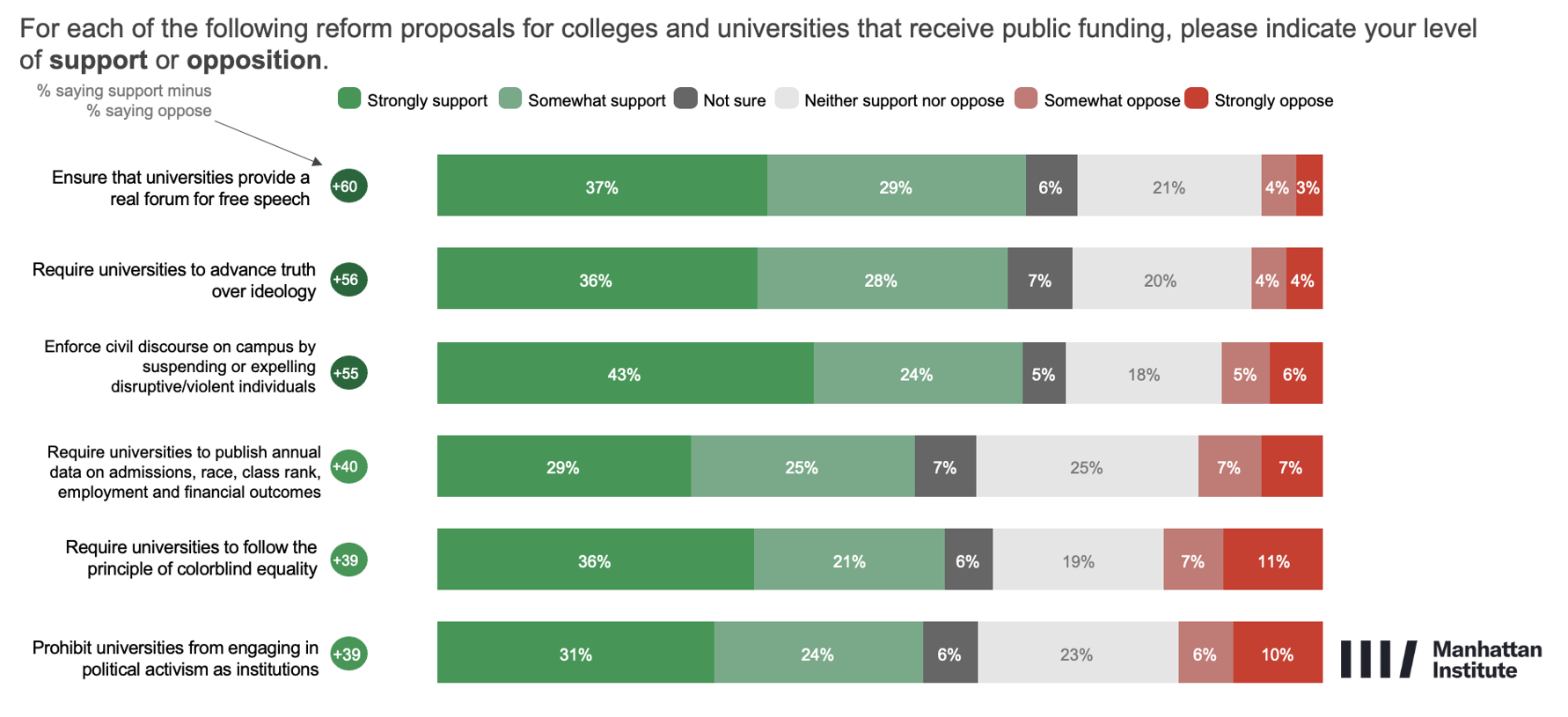
Almost two in every three registered voters (64%) support requiring universities to advance truth over ideology by enforcing rigorous academic standards, controlling for academic fraud, requiring preregistration of scientific studies, and basing decisions on merit; only 8% are opposed. This wins majority support among every group, including Democrats (60%), independents (59%) and Republicans (76%).
There is also majority support (55%) for prohibiting universities from engaging in political activism as institutions, with only 16% opposed. Majorities of almost all groups support this, including Democrats (42% support to 28% oppose).
We also asked voters whether universities should be required to adopt a colorblind approach—eliminating DEI bureaucracies, ending racially segregated programs, and banning the use of race in admissions, hiring, promotions, and contracting. A majority, 57%, supported the policy, with only 18% opposed. Support held across party (44% to 30% among Democrats; 74% to 6% among Republicans) and racial lines (50% to 19% among Black voters; 58% to 19% among Hispanics; 43% to 25% among Asians; and 60% to 17% among Whites).
Two in every three (66%) registered voters back a policy to ensure that universities provide a real forum for free speech, by protecting dissenting views and ensuring a wider range of debate beyond the dominant campus consensus. Only 7% are opposed to this. As with the previous reform, this proposal is backed by a majority of every group in society.
The most popular reform—with 67% support, vs only 11% opposed) is to enforce civil discourse on campus by suspending or expelling individuals who disrupt events, vandalize property, occupy buildings, call for violence, or interrupt university operations. This draws majority support from all demographic groups, including 18–29-year-olds (61%) and Democrats (57%).
Finally, by a 54% to 14% margin, Americans support requiring universities to publish annual data on admissions, race, class rank, employment and financial outcomes by major, and campus surveys on ideology, free speech, and civil discourse.
Top Priority is Enforcing Civil Discourse
When asked which of these reforms they would most like to see implemented, a majority of respondents chose enforcing civil discourse on campus by suspending or expelling individuals who disrupt events, vandalize property, occupy buildings, call for violence, or interrupt university operations. This is the top priority for 23%, followed by ensuring universities provide a real forum for free speech (21%).
Accordingly, 58% support police removing illegal encampments from campuses—compared with only 16% opposed. This is supported for majorities in all groups except among Democrats—but Democratic voters are still more likely to support police action than not, by 42% to 26%.
Figure 5: Strong support for police removing illegal encampments on campuses
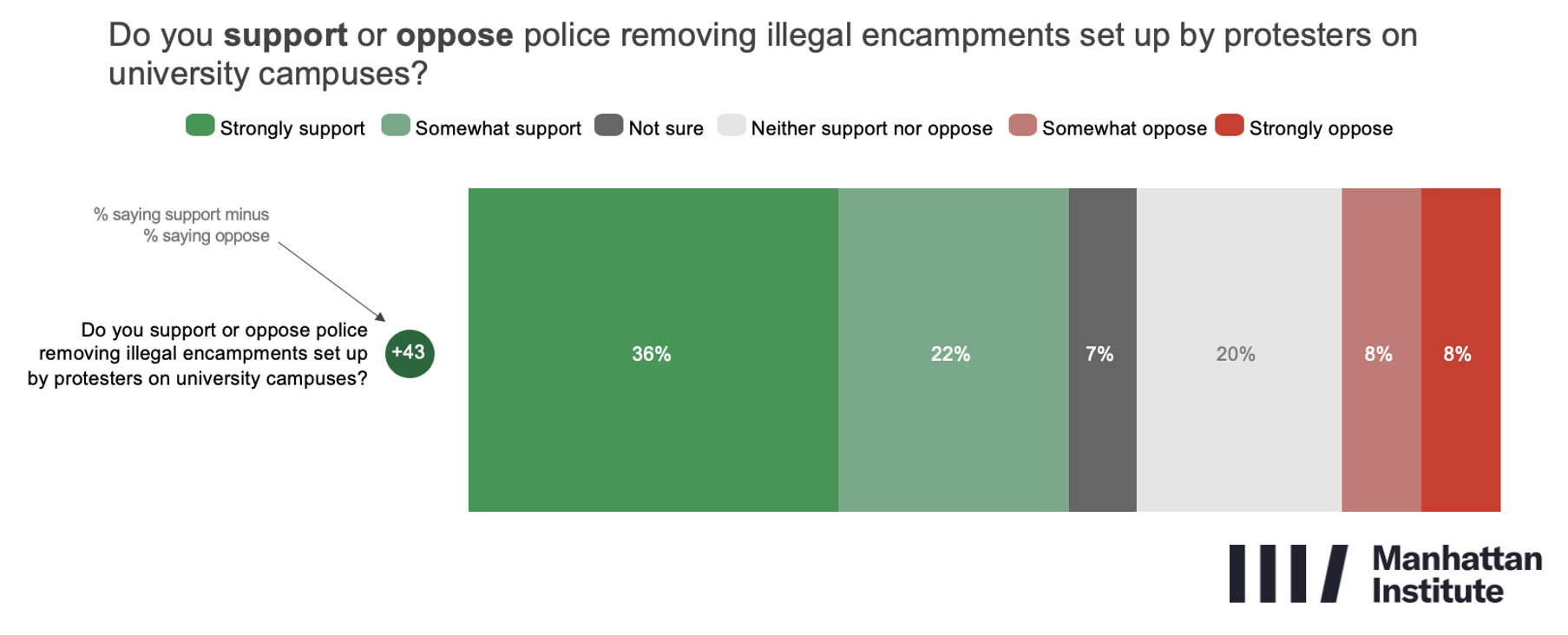
There is stronger support for colleges and universities banning individuals from wearing masks or covering their faces in public with the intent to conceal their identity. Nearly six in ten (59%) support this, with only 17% opposed.
Figure 6: Cross-party support for banning face coverings to conceal one’s identity on campus
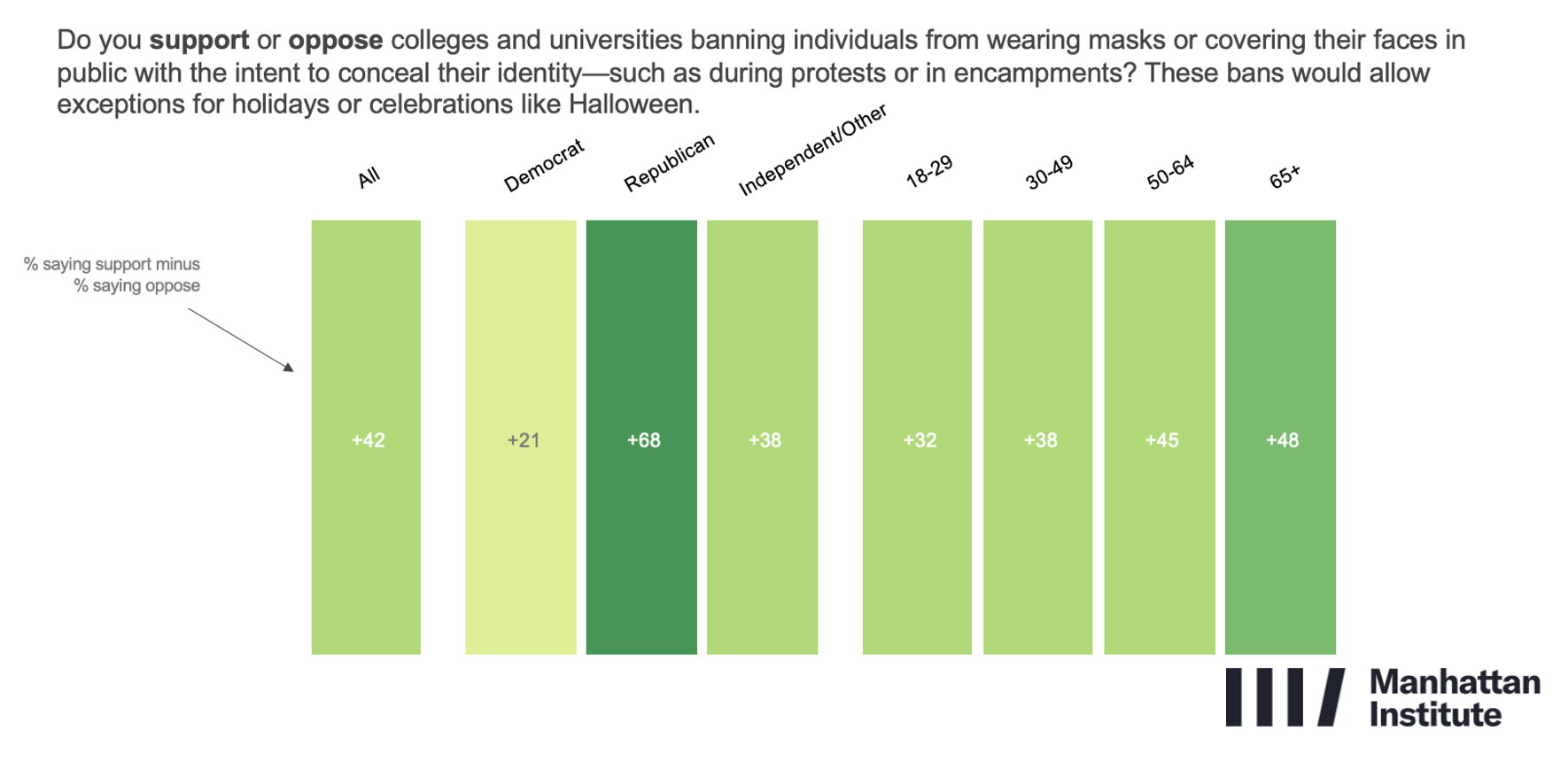
Protests on Campus
We presented respondents with a range of protest activities that have taken place on campuses over the past year and asked which ones universities and colleges should allow and which ones they should prohibit.
The results were resounding, with a majority of voters saying that schools should prohibit: damaging or destroying school property (79%), calling for violence or elimination of a specific ethnic or religious group (75%), calling for violence against or elimination of a specific country (73%), burning the American flag (70%), burning the flag of another country (70%), expressing support for a designated terrorist organization (63%), setting up an encampment (59%), and using loudspeakers or making disruptive noise (53%).
Figure 7: Americans back the right to protest, but want proportionate bans on disruptive behavior on campuses
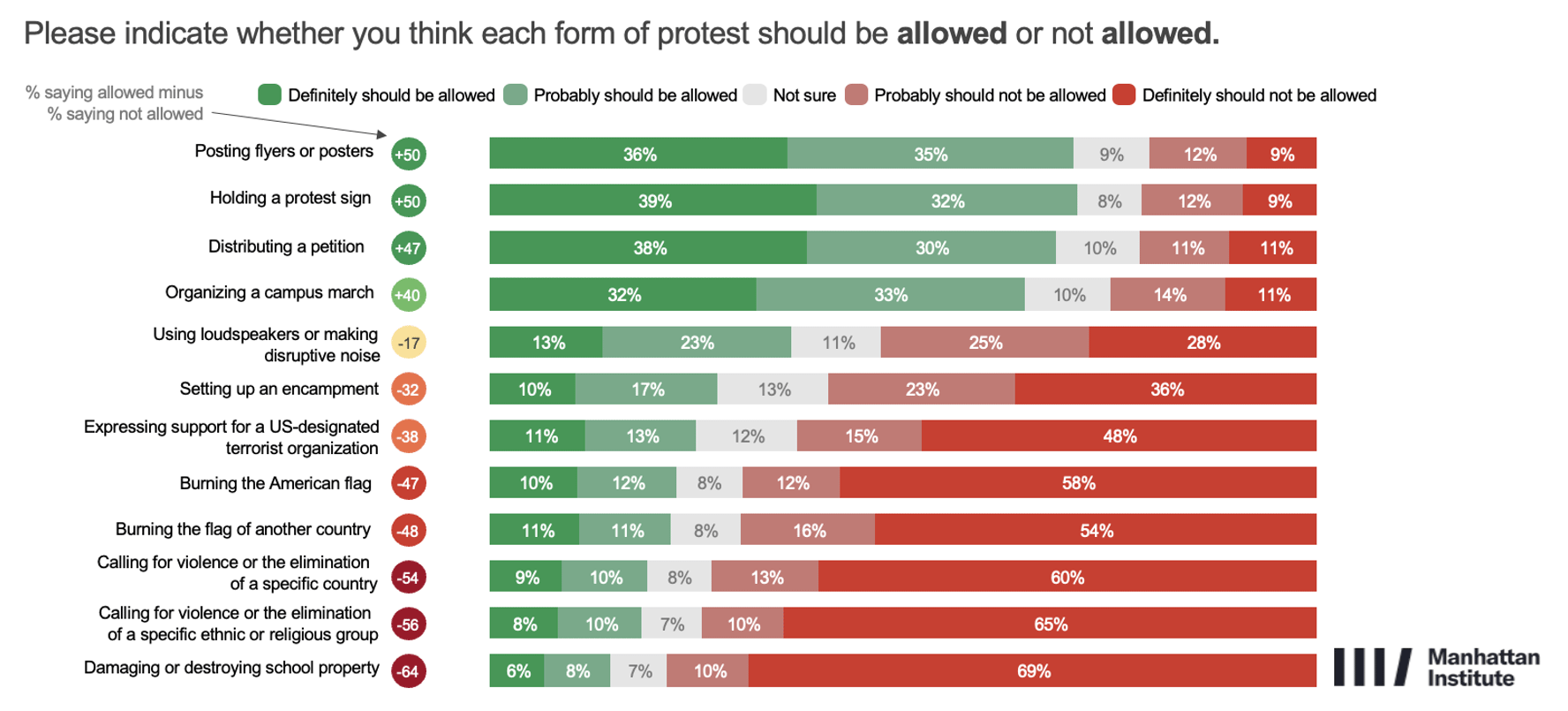
Such views transcend party and age, with similar net support for banning these activities across all groups. Only 18–29-year-olds differ in their narrow support of the use of loudspeakers in protests.
Figure 8: A cross-American consensus
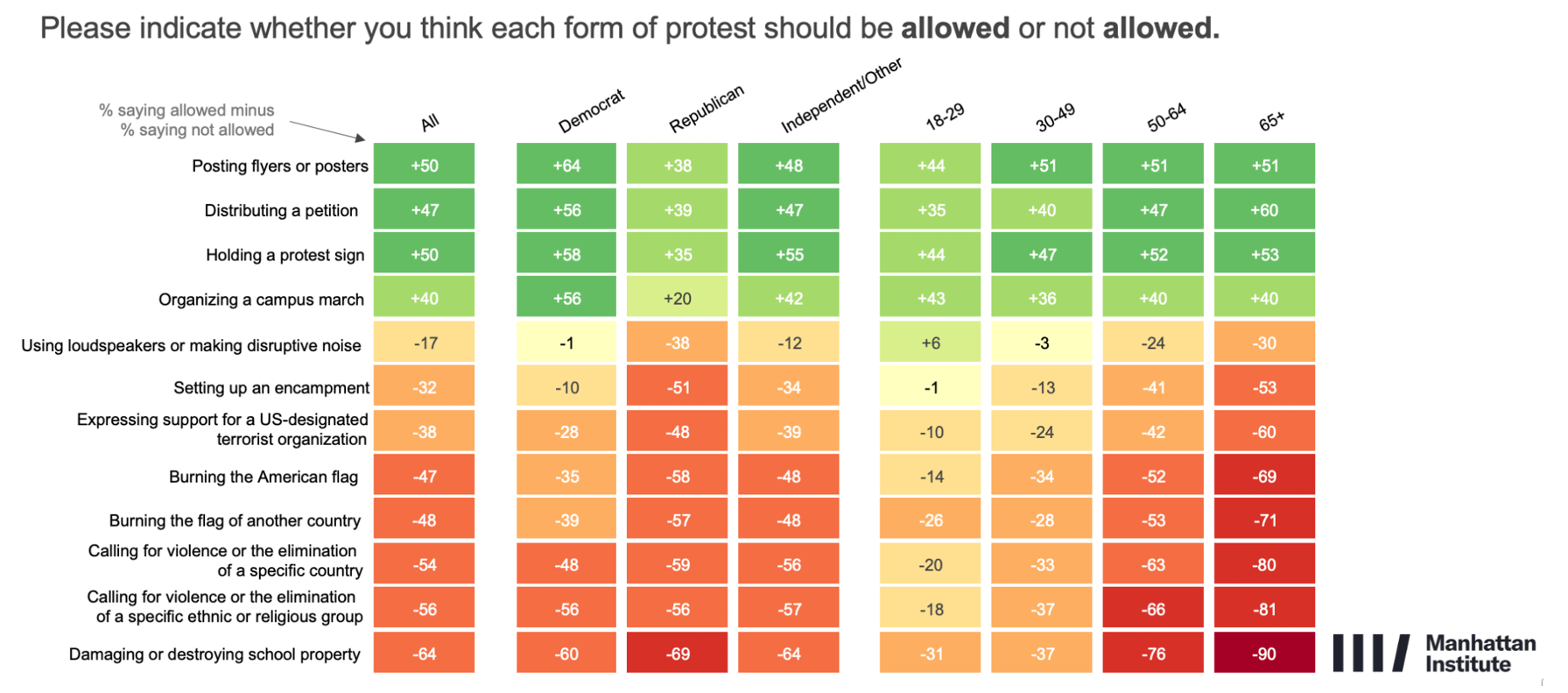
Cross-Party, Cross-Race Support for Colorblind Admissions
In overwhelming numbers, Americans support race-neutrality in hiring and admissions on college campuses. More than seven in ten registered voters (71%) believe that potential university students and staff should be treated equally regardless of their color, race, or gender. Only a small minority of Americans (20%) say that race- or gender-conscious preferences are closer to their view.
Figure 9: A resounding majority for colorblind treatment in admissions
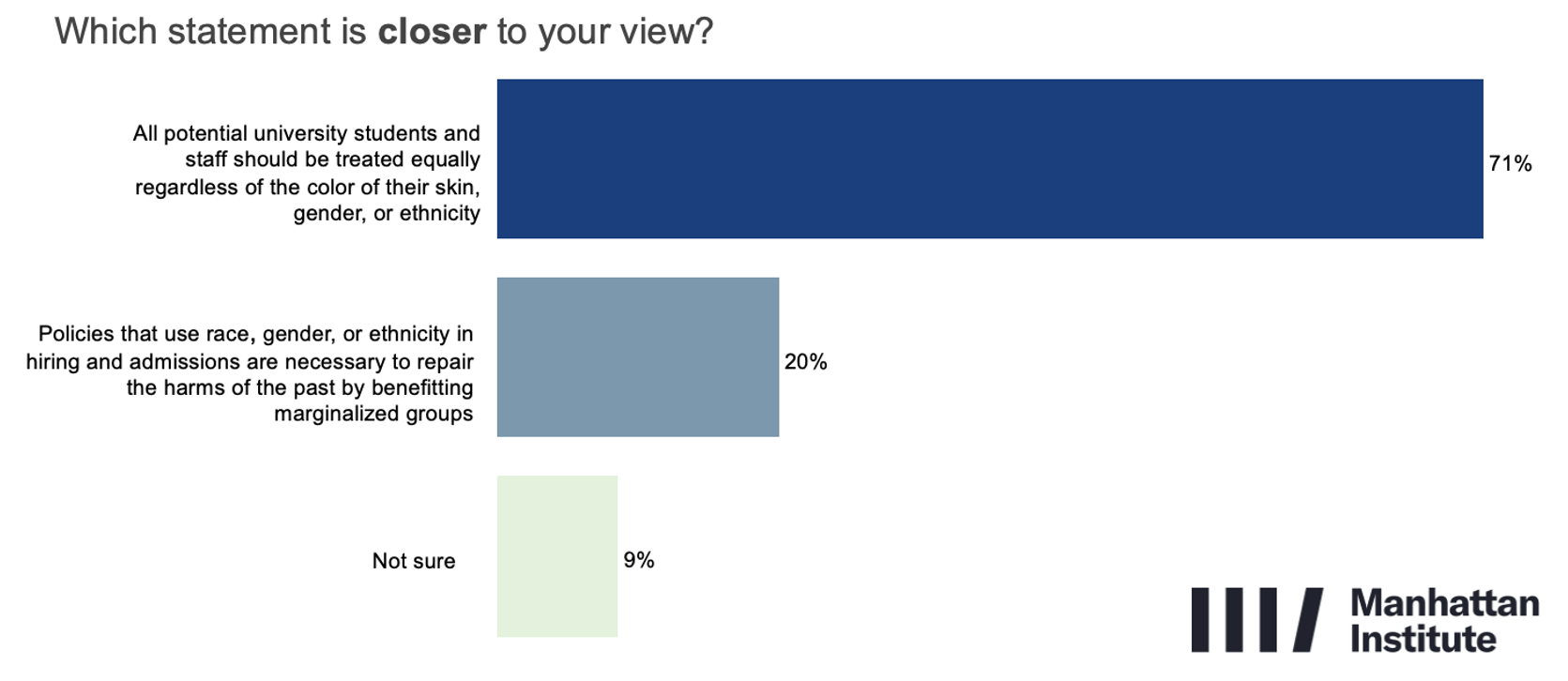
A race-neutral approach is preferred by majorities in all groups, including Democrats (69%), Republicans (79%) and independents (66%), as well as White voters (77%), Black voters (54%), Hispanic voters (67%), and Asian voters (55%).
Similarly, 47% of respondents support banning colleges and universities from considering race or ethnicity in admissions or hiring, with 28% opposed; 25% are undecided or unsure. Republican voters strongly support such a ban (60% support to 21% oppose), as do a plurality of independents (43% to 28%). Democrats are split (37% to 35%).
This proposal is also supported by Black (43% to 24%) and Hispanic voters (40% to 31%), while Asian voters are split (31% to 32%).
The DEI Debate
A large plurality of voters (48%) say publicly funded universities should not support DEI bureaucracies, which they see as political and discriminatory. On the other hand, 39% say that publicly funded universities should have DEI teams because the public has an interest in promoting racial justice and fighting white supremacy.
Figure 10: A plurality believe restrictions on DEI should be in place for publicly-funded colleges
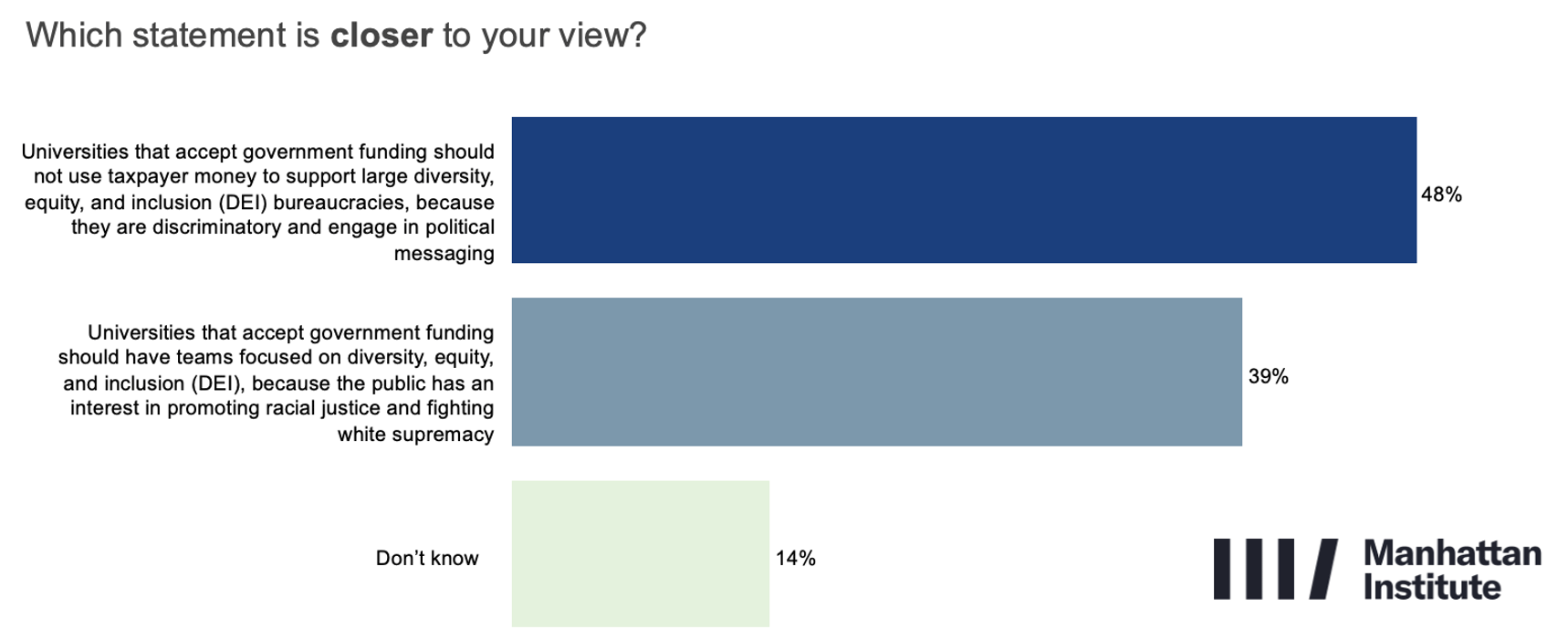
This question splits the public on party and racial lines: the first statement is preferred by White (51% to 35%), Hispanic (48% to 42%), Republican (69% to 24%) and independent voters (44% to 37%), while the second statement is preferred by Democrats (31% to 56%), Black voters (43% to 46%) and Asian voters (30% 53%). Nevertheless, it is notable that 43% of Black voters and 48% of Hispanic voters now oppose DEI efforts in taxpayer-funded universities.
Photo: Barry Winiker / The Image Bank via Getty Images
Are you interested in supporting the Manhattan Institute’s public-interest research and journalism? As a 501(c)(3) nonprofit, donations in support of MI and its scholars’ work are fully tax-deductible as provided by law (EIN #13-2912529).

















